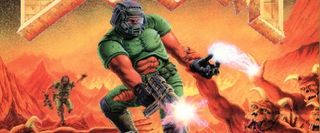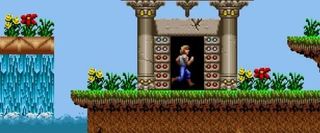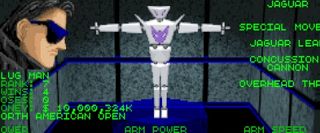Industry Blend: Companies Supported Piracy When It Was Shareware

A lot of new-school gamers probably read the headline and go..."Huh, shareware? What's that?" us old-school gamers know the phrase all too well. Actually, many big companies and surviving studios from the golden age of gaming also know it well, but today they call it piracy.
You see, way back in the late 80s and early 90s developers were just coming into their own outside of the arcade market. It wasn't easy getting a game noticed that wasn't under a major publishing label. It was also almost next to nigh impossible for indie devs to get any kind of recognition, especially in comparison to nowadays where indie devs are actually quite well known in most gaming circles.
See, back then in order to get many PC games recognized you either had to get it noticed in a major gaming publication like Nintendo Power, GamePro, Ultra Gamers or Game Informer, or you had to use a method that helped turn the tide of the PC market into the major force that it is today: Shareware.
Demos and trial versions of games still existed during this time, however, only the bigger PC game releases relied on demos. Most other game studios reverted to a more unique way of getting attention, sharing about a third of the entire game in episodic content between $9.95 and $19.95 per episode or the full package which usually clocked in at about $44.95. For first-person shooters like Rise of the Triads, Blake Stone, Wolfenstein 3D, Hugos House of Horror 3D or Doom, it meant getting nine fully playable levels with an extra bonus level included. Most of all the weapons and enemies were also included in the shareware package.

For side-scrollers and misc games like Traffic Department 2192, BioMenace, Jill of the Jungle, Zone 66 or Xargon it meant receiving six or maybe eight challenging levels that carried over an entire story-arc. In essence, a shareware package back in the 90s gave you pretty much the same play-time of today's games but at a fraction of the cost and with a lot of cliffhangers.
Now here's where things really get unique, most companies actually encouraged gamers to share the product in order to spread the word. It was like advertisement via free file-sharing. Nowadays, when you buy a product and file-share it with friends, companies call it piracy.
The great thing about shareware is that it offered up tons of fun and a lot of content. The only thing costly in the venture (if you didn't buy the original package from in store) was the 3.5 inch floppy disks. Since 3.5 floppys could only store 1.44MB and most games averaged around 2MB at the time, you had to copy the games onto two disks, which could get expensive. But other than keeping a good supply of 3.5 disks on hand, you could basically get a game with anywhere between six and eight hours of fun -- sometimes even more depending on the difficulty of the game -- for free.
CINEMABLEND NEWSLETTER
Your Daily Blend of Entertainment News

What's funny is that during the shareware period it's how some top name companies today even made it to where they are. Sierra Interactive, for example, shared in the success of the shareware era with stuff like Betrayal at Krondor, A-10 Tank Killer and Red Baron. Sierra eventually turned into Vivendi Universal and now they're part of the largest publishing force on the planet, Activision-Blizzard.
You know Cliffy B., the lead designer of Gears of War? Well, I don't know if he'll like this but before he was getting in touch with his inner machismo he was hamming it up with side-scrolling action titles such as Jazz Jackrabbit, which gained popularity thanks to (dun, dun, dun) shareware...now known as piracy.
For Epic Games they surged through the early 1990s with a lot of popular shareware titles, including Epic Pinball -- which is actually one of the best pinball games out there -- Jill of the Jungle, Xargon and one of the most highly underrated and best-balanced fighting games ever made, One Must Fall: 2097. Their top rival at the time was Apogee Software which produced well-known old-school games such as the Mario Kart-clone Wacky Wheels and Duke Nukem 1, 2 and Duke Nukem 3D which also gained fame thanks to shareware. Heck, even id Software accelerated throughout the gaming sphere of the mid 1990s thanks to shareware with games like Doom, Hexen, Heretic and even Quake.

That's right, the advent of many popular genres on PC that helped shape genres and eventually spilled over onto home consoles gained said fame because of piracy. But it was all okay and all encouraged because back then companies didn't have one of the biggest money-sucking mediums that pervade today's industry: marketing (no offense to the PR folk that do a wonderful job of sending us over screenshots, trailers and fact sheets).
Big publishers these days rely on companies like Forty-Seven, Edelman and Bender Helper Impact, but back then many publishers had to rely on the very thing that current-day publishers fear more than anything else: word of mouth. In essence, gamers were the marketers and shareware was the media asset.
Nowadays, non-AAA publishers, distributors and developers still support the "shareware" mentality like Rovio and GOG despite many big publishers like Ubisoft actively attacking the gaming community that keeps them in business. We also have companies like CD Projekt and 38 Studios that sees pirating stats from TorrentFreak and they misconstrue the numbers as "sales lost" as opposed to potential fans gained.

While piracy is viewed as an evil to all things digitally distributed, piracy represents an aspect of the market that changed the way it presents goods to the consumer, even though the consumer never changed.
Where is today's version of shareware? Gamers still like being able to play enough of a game to know whether it's worth a full retail purchase or at least having the option to buy the game in "episodes". Nowadays we get full retail prices, additional DLC that contains the "rest of the game" and a lot of badgering from those same AAA publishers about how used games are evil and pirates are killing the industry. Even though studios such as Black Rock Studios, Bizarre Creations, Budcat Creations, and Codemasters all shut down in relation to supposedly poor console sales, so what does that tell you?
The closest thing we get to shareware in this day and age are free-to-play titles, but I think I speak for everyone when I say that they're not really the same thing at all. While F2P grants you free access to the game, no matter how much you spend or put into it you'll never own a free-to-play title and the contents you purchase are liable to whatever the company decides to do with the game.
Is it possible that bringing back shareware could potentially help curb the amount of piracy happening in both the PC and console arena? Possibly. For the most part shareware represented an age where consumers were in control. Publishers aimed to please. Marketing was about positive word of mouth, not how many trailers, posters and celebrity actors you could get to help promote your game. As a publisher, shareware could make or break you based on the quality of the product. As a gamer, shareware gave you a lot for a little (or nothing at all). As an industry, shareware helped shape the golden age of gaming.
Staff Writer at CinemaBlend.

One Piece’s Biggest Dubbed Episode To Date Is Coming To Streaming, And Just In Time For Monkey D. Luffy’s Birthday

TV Icon Tom Selleck Talks 'Accidental Career' And Why He Was Hesitant To Tell Life Story Even In The Era Of Celeb Memoirs

Now You See Me 3 Has Taken A Huge Step Forward With Three New Castings, And It’s Great To See A Star Wars Actor Among Them
Most Popular





